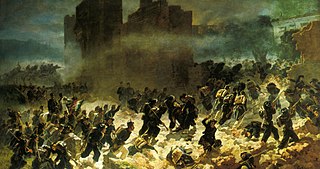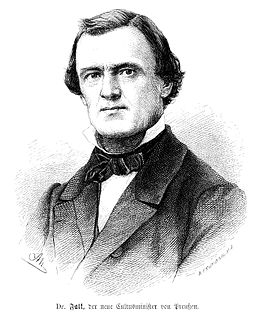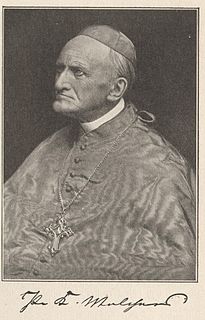
The First Vatican Council was convoked by Pope Pius IX on 29 June 1868, after a period of planning and preparation that began on 6 December 1864. This, the twentieth ecumenical council of the Catholic Church, held three centuries after the Council of Trent, opened on 8 December 1869 and adjourned on 20 October 1870. Unlike the five earlier general councils held in Rome, which met in the Lateran Basilica and are known as Lateran councils, it met in the Vatican Basilica, hence its name. Its best-known decision is its definition of papal infallibility.

Ultramontanism is a clerical political conception within the Catholic Church that places strong emphasis on the prerogatives and powers of the Pope.

Pope Leo XIII was the head of the Catholic Church from 20 February 1878 to his death in 1903. He was the oldest pope, with the exception of Pope Benedict XVI as emeritus pope, and had the third-longest confirmed pontificate, behind those of Pius IX and John Paul II.

Pius IX was head of the Catholic Church from 1846 to 1878, the longest papal reign. After starting as a liberal he reversed positions and strongly condemned liberalism. He was notable for convoking the Vatican Council in 1868 and for permanently losing papal control of the Papal States in 1870 to the Kingdom of Italy. He refused to leave Vatican City, declaring himself a "prisoner of the Vatican". His diplomacy mixes many failures with some successes such as Austria-Hungary, Portugal, Spain, Canada, Tuscany, Ecuador, Venezuela, Honduras, El Salvador, and Haiti.
Kulturkampf was the conflict that took place from 1872 to 1878 between the government of the Kingdom of Prussia led by Otto von Bismarck and the Roman Catholic Church led by Pope Pius IX. The main issues were clerical control of education and ecclesiastical appointments. A unique feature of Kulturkampf compared to other struggles between the state and the Catholic Church in other countries was its anti-Polish component.

The Reichskonkordat is a treaty negotiated between the Vatican and the emergent Nazi Germany. It was signed on 20 July 1933 by Cardinal Secretary of State Eugenio Pacelli, who later became Pope Pius XII, on behalf of Pope Pius XI and Vice Chancellor Franz von Papen on behalf of President Paul von Hindenburg and the German government. It was ratified 10 September 1933 and it has been in force from that date onward. The treaty guarantees the rights of the Catholic Church in Germany. When bishops take office Article 16 states they are required to take an oath of loyalty to the Governor or President of the German Reich established according to the constitution. The treaty also requires all clergy to abstain from working in and for political parties. Nazi breaches of the agreement began almost as soon as it had been signed and intensified afterwards leading to protest from the Church including in the 1937 Mit brennender Sorge encyclical of Pope Pius XI. The Nazis planned to eliminate the Church's influence by restricting its organizations to purely religious activities.

Baron Wilhelm Emmanuel von Ketteler was a German theologian and politician who served as Bishop of Mainz. His social teachings became influential during the papacy of Leo XIII and his encyclical Rerum novarum.

The history of the papacy, the office held by the pope as head of the Catholic Church, according to Catholic doctrine, spans from the time of Peter to the present day.

The Roman Question was a dispute regarding the temporal power of the popes as rulers of a civil territory in the context of the Italian Risorgimento. It ended with the Lateran Pacts between King Victor Emmanuel III of Italy and Pope Pius XI in 1929.

The Capture of Rome on September 20, 1870, was the final event of the long process of Italian unification also known as the Risorgimento, marking both the final defeat of the Papal States under Pope Pius IX and the unification of the Italian peninsula under King Victor Emmanuel II of the House of Savoy.

The Falk Laws, named after education minister Adalbert Falk, of 1873-1875 were legislative bills enacted in the German Kingdom of Prussia during the Kulturkampf conflict with the Catholic Church. The May Laws had the fullest support of Bismarck, though their actual author was Falk, the Prussian minister of public worship. Preliminary to the May Laws was the abolition of the Catholic department in the ministry of public worship (1871), the placing of the State in exclusive control of education, and the expulsion of the Jesuits from the empire (1873). A year later a like expulsion was decreed against the Redemptorists; Lazarists; Priests of the Holy Ghost, and Nuns of the Sacred Heart as being religious associations allied to the Jesuits. The May Laws proper of 1873 were chiefly as follows:

Paul Melchers was a Cardinal and Archbishop of Cologne. At the height of the Kulturkampf he took refuge in the Netherlands.

The Vatican and Eastern Europe (1846–1958) describes the relations from the pontificate of Pope Pius IX (1846–1878) through the pontificate of Pope Pius XII (1939–1958). It includes the relations of the Church State (1846–1870) and the Vatican (1870–1958) with Russia (1846–1918), Lithuania (1922–1958) and Poland (1918–1958).

Vatican during the Savoyard era describes the relation of the Vatican to Italy, after 1870, which marked the end of the Papal States, and 1929, when the papacy regained autonomy in the Lateran Treaty, a period dominated by the Roman Question.

The history of the Catholic Church is the formation, events, and transformation of the Catholic Church through time. The origin of the Catholic Church is debated.

Papal infallibility is a dogma of the Catholic Church which states that, in virtue of the promise of Jesus to Peter, the pope when appealing to his highest authority is preserved from the possibility of error on doctrine "initially given to the apostolic Church and handed down in Scripture and tradition". This doctrine was defined dogmatically at the First Vatican Council of 1869–1870 in the document Pastor aeternus, but had been defended before that, existing already in medieval theology and being the majority opinion at the time of the Counter-Reformation.

The history of the Catholic Church in Germany should be read in parallel with the History of Germany as the Church was progressively confused, in competition with, oppressed by and distinguished from, the state. The long history of Roman Catholicism in Germany can also explain much of the History of the Roman Catholic Church, especially in the period of the Middle Ages, under the Holy Roman Empire.
The relationship between Pope Leo XIII and Poland was marked by the German-led Kulturkampf, which led to the persecution of ethnic Poles in Prussia and German Catholics in Germany.

Formal diplomatic relations between the Holy See and the current Federal Republic of Germany date to the 1951 and the end of the Allied occupation. Historically the Vatican has carried out foreign relations through nuncios, beginning with the Apostolic Nuncio to Cologne and the Apostolic Nuncio to Austria. Following the dissolution of the Holy Roman Empire and the Congress of Vienna, an Apostolic Nuncio to Bavaria replaced that of Cologne and that mission remained in Munich through several governments. From 1920 the Bavarian mission existed alongside the Apostolic Nuncio to Germany in Berlin, with which it was merged in 1934.

The theology of Pope Pius IX championed the pontiff's role as the highest teaching authority in the Church.















